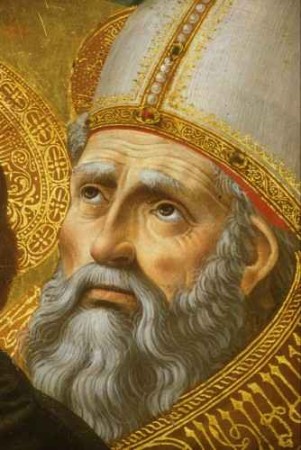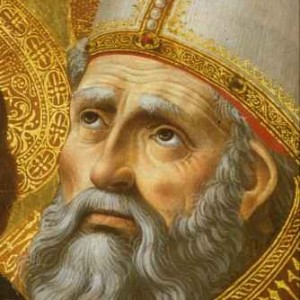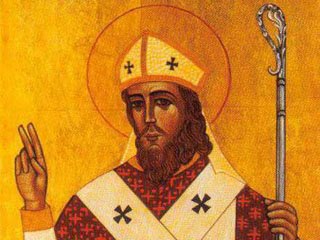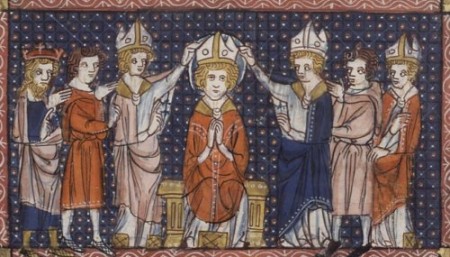 |
| St. Augustine of Hippo |
St. Augustine is one of the few Saints that both Catholics and (most) Protestants admire. Without a doubt, he is the most popular Saint among Protestants, and is the most-cited Saint in the Catechism. As such, he’s a good Saint for Catholics to cite to when explaining the faith to Protestants.
But who do you appeal to if you are St. Augustine? That is, during Augustine’s lifetime, who were the Saints that he could cite to, knowing that their authority and orthodoxy were nearly universally respected? Augustine actually answers that question in Against Julian, accusing Julian of going against the “many famous and brilliant holy teachers of the Catholic truth: Irenaeus, Cyprian, Reticius, Olympius, Hilary, Gregory, Basil, Ambrose, John, Innocent, Jerome, and the others.”
Of these eleven Saints, there is one in particular who Augustine cites for his outspoken orthodoxy: St. Hilary of Poitiers, a fourth century Gallic (French) bishop known as “the Hammer of the Arians.” Augustine remarks, “Who does not know that the Gallic bishop Hilary is to be revered as the keenest defender of the Catholic Church against the heretics?”
And while Hilary is certainly less well-known than Augustine, he is revered as a Saint by Catholics and Orthodox, as well as by Lutherans and Anglicans. Given all of this, it would behoove both Protestants and Catholics to listen to what St. Hilary has to say about issues like the Real Presence of Christ in the Eucharist.
Hilary not only believes in the physical Real Presence, he treats this fact as completely obvious to any Christian. In doing this, he sounds very much like St. Ignatius of Antioch, who used the Real Presence as proof back in the early 100s. That is, Ignatius didn’t feel a need to prove that the Real Presence was true. Instead, he started from the accepted truth of the Real Presence to prove that the Gnostics were heretics for denying the Incarnation.
We see the same thing here. St. Hilary’s opponents argue that the Father and the Son are only One in will, rather than One in Being. Hilary responds to them by showing, from the accepted fact of the Real Presence, that the union between us and the Son, and therefore between the Son and the Father, goes beyond a mere unity of wills:
St. Hilary of Poitiers Now I ask those who bring forward a unity of will between Father and Son, whether Christ is in us to-day through verity of nature or through agreement of will. For if in truth the Word has been made flesh and we in very truth receive the Word made flesh as food from the Lord, are we not bound to believe that He abides in us naturally, Who, born as a man, has assumed the nature of our flesh now inseparable from Himself, and has conjoined the nature of His own flesh to the nature of the eternal Godhead in the sacrament by which His flesh is communicated to us? [….]
Now how it is that we are in Him through the sacrament of the flesh and blood bestowed upon us, He Himself testifies, saying, “And the world will no longer see Me, but ye shall see Me; because I live ye shall live also; because I am in My Father, and ye in Me, and I in you” [John 14:19]. If He wished to indicate a mere unity of will, why did He set forth a kind of gradation and sequence in the completion of the unity, unless it were that, since He was in the Father through the nature of Deity, and we on the contrary in Him through His birth in the body, He would have us believe that He is in us through the mystery of the sacraments?
Hilary’s point isn’t to prove that “we in very truth receive the Word made flesh as food from the Lord.” His point is that since this is true, we know that we’re dealing with a union of natures, not just wills. But in the process of making this point about the Trinity, Hilary happens to reveal quite a bit about what the early Church believed about the Real Presence of Jesus Christ in the Eucharist. And his point is all the more powerful in that he’s making incredibly Catholic claims about the Eucharist, without feeling much of a need to defend his views:
The Ordination of Saint Hilary (14th c.) Hence, if indeed Christ has taken to Himself the flesh of our body, and that Man Who was born from Mary was indeed Christ, and we indeed receive in a mystery the flesh of His body—(and for this cause we shall be one, because the Father is in Him and He in us),—how can a unity of will be maintained, seeing that the special property of nature received through the sacrament is the sacrament of a perfect unity?
How should we understand our union with Christ in the Eucharist? Hilary shows us from Scripture:
Let us read what is written, let us understand what we read, and then fulfil the demands of a perfect faith. For as to what we say concerning the reality of Christ’s nature within us, unless we have been taught by Him, our words are foolish and impious. For He says Himself, “My flesh is meat indeed, and My blood is drink indeed. He that eateth My flesh and drinketh My blood abideth in Me, and I in him.” [John 6:55-56]
So in the Eucharist, we aren’t just aligned as part of God’s team. We take on the Body of Christ. We become what we consume. If there was any remaining ambiguity about whether or not Hilary understood the Eucharist to be Christ’s literal, physical Body and Blood, there can be none after his next comment:
As to the verity of the flesh and blood there is no room left for doubt. For now both from the declaration of the Lord Himself and our own faith, it is verily flesh and verily blood. And these when eaten and drunk, bring it to pass that both we are in Christ and Christ in us. Is not this true? Yet they who affirm that Christ Jesus is not truly God are welcome to find it false. He therefore Himself is in us through the flesh and we in Him, whilst together with Him our own selves are in God.
So Hilary leaves room to deny the Real physical Presence of Christ in the Eucharist … but only if you’re ready “to affirm that Christ Jesus is not truly God.” If, on the other hand, you’re going to believe in Jesus Christ as God Incarnate, the Real Presence is an indispensable part of that faith. It seems that Hilary can’t even imagine someone denying the Eucharist while claiming to worship Jesus Christ. He leaves no room for that position, since “no man shall dwell in Him, save him in whom He dwells Himself, for the only flesh which He has taken to Himself is the flesh of those who have taken His.”
Hilary then returns to showing how the Eucharist gives evidence of the relationship of Christ to the Father:
This is the cause of our life that we have Christ dwelling within our carnal selves through the flesh, and we shall live through Him in the same manner as He lives through the Father. If, then, we live naturally through Him according to the flesh, that is, have partaken of the nature of His flesh, must He not naturally have the Father within Himself according to the Spirit since He Himself lives through the Father?
So that’s it: that’s the Catholic belief in the Eucharist, according to the man who Augustine described as “the keenest defender of the Catholic Church against the heretics.” I’ll leave it to you to decide if Hilary was an idolatrous heretic, or if the Real Presence of Christ’s Flesh and Blood in the Eucharist is true.



Sometimes I daydream of a time when the Church was immersed in Jewish culture, and a neophyte challenges the Bishop to explain the Eucharist’s role in theosis while standing on one foot and the Bishop says:
“You are what you eat.”
It’s all about the Mass. People still reject it today as they did in John 6. People don’t want to believe that they are “eating” Christ. The Devil has removed the supernatural from our culture and once the supernatural is gone people will believe anything (i.e. Chesterton!).
It is a beautiful Teaching of the Church and it is a shame that Protestants don’t see it. St. Hilary is saying that we are in Christ and Christ is in us by virtue of His incarnation. It is reminiscent of what St. Peter said:
2 Peter 1:4
King James Version
Whereby are given unto us exceeding great and precious promises: that by these ye might be partakers of the divine nature, having escaped the corruption that is in the world through lust.
It is also reminiscent of this saying attributed to Athanasius:
“For the Son of God became man so that we might become God.”
And so the Eucharist is indeed the Sacrament of Unity:
1398 The Eucharist and the unity of Christians. Before the greatness of this mystery St. Augustine exclaims, “O sacrament of devotion! O sign of unity! O bond of charity!” The more painful the experience of the divisions in the Church which break the common participation in the table of the Lord, the more urgent are our prayers to the Lord that the time of complete unity among all who believe in him may return.
But to Protestants, this sounds like blasphemy. Sad indeed.
Sincerely,
De Maria
It is really unfathomable to me why anyone would be a protestant in this day and age. The only reasons I can think of aren’t very charitable. Intellectual laziness, ignorance of history, hatred for the Church, unwillingness to be obedient, just going with what they were raised in without questioning it… I came from a background of no faith. All I knew was secular history. And simply based on that knowledge which wasn’t very extensive I knew it for a fact that the Catholic Church was the original Church and all the others had no leg to stand on. I don’t see how these people can have any excuse for what they believe. It’s like in Peter Kreeft’s conversion story. His calvinist professor said that the Church got some barnacles on it and it had to be cleaned, so that’s what they did in the Protestant ‘reformation’. But Peter Kreeft could read on his own that that was just a bald faced lie when he read the Church Fathers.
Right there with you.
I came from a background of a lapsed-Episcopalian, and even I could see that the Protestant arguments didn’t hold much weight. My own study of Ancient History and languages only reenforced my belief that the Catholic Church is It. It is the Truth.
From just a simple reading of the Bible Jesus obviously founds a Church, or if you will, an organization of some sort. This organization is made up of a group of people, with twelve guys in charge of it. There is one man by the name of Simon who Jesus renames to Peter, and he had a prominent position within the leadership of this organization. If you assume that Jesus is God, that his promises are therefore kept without question, and he promised that this organization he founded wouldn’t ever go away, then this organization should still be around somewhere on planet Earth today. Also this organization should be able to trace its own lineage back to those first twelve leaders, and Peter in particular.
The only group that is making the claim:
“We are the organization that Jesus founded 2000 years ago, who we believe in the face of murderous persecution is God in the Flesh, and our current leader is the most recent successor to the man whose name was changed from Simon to Peter by Jesus. Not only that, but the historical record shows a continuance from 2000 years ago to today in our hierarchy structure of our organization and our form of worship. And we are therefore the Church founded by Jesus.”
is the Catholic Church.
Even if you believe that the Gospel are totally made up, fairy-tale, make-believe which would be best put alongside the stories of Zeus, and the Easter Bunny, you really can’t deny that the Catholic Church has been believing in it for 2000 years.
I don’t know guys…
https://www.youtube.com/watch?v=5bEddhPPsuw
Seems plausible to me.
Peter Rabbit–St. Peter–mitre tall enough to cover up the bunny ears.
Rebecca –
You aren’t alone. I truly believe the Internet is a gift from God. Catholicism now has the means to provide mountains of data and evidence to refute Protestantism at the click of a button. Many will continue to choose to ignore the evidence. I don’t which is why I converted. I could no longer breate a Protestant breath with the weight of evidence for the Catholic Church from history AND SCRIPTURE. If you read Scripture with glasses that don’t work you’ll never understand it.
This comment has been removed by the author.
Rob:
The only group that is making the claim… is the Catholic Church.
As a Protestant, I’m a bit puzzled by this claim. I think most Protestants would agree that they trace their lineage through those twelve men, as well as through Paul, Apollos, and the other early leaders, back to Christ.
They’d disagree, of course, as to exactly what role Peter played relative to the other early leaders, and whether “this organization” is a room for a single denomination or a house encompassing many churches – but to your specific claim re: a continuity of organization from Christ and his earliest followers, I don’t think Catholicism can claim exclusivity.
Noting that Church history did not cease with the death of the last Apostle, and resume in the 16th century, I politely encourage you to look closely at the intervening 1400 years, starting at the beginning.
I am drawn to the early church, and I am leading a teaching sermon series on the early church right now called “Road Trip Through Church History.” St. Hilary’s words grabbed my attention when he said, “we indeed receive in a mystery the flesh of His body” I can certainly agree with these words. The ELCA has stated in our document “The Use of the Means of Grace” that “This real presence is a mystery.” Thank you, Joe, for noting that the Lutherans and Anglicans respect him as a saint.
Off topic but perhaps interesting nonetheless. My son Patrick, who has Autism Spectrum Disorder, was confirmed under the name Hilary. Among other things “the Hammer of the Arians” is the patron saint of the developmentally disabled.